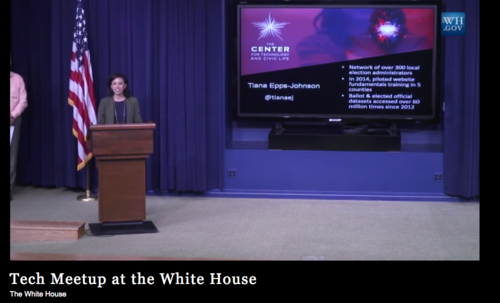Reporting back from the White House Tech Meetup
The Center’s Executive Director, Tiana Epps-Johnson, attended the first-ever White House Tech Meetup on Friday April 17. A Meetup is a self-organized group of people who want to do or share something with their community. Meetups can be organized around broad issues like hobbies and crafts, technology, or fitness. Meetups can also gather around a specific topic like Chicago City Data Users.

The U.S. Chief Technology Officer, Megan Smith, welcomed the group with great energy, encouraging folks in the room to connect with each other so they could learn how the power of technology might reach even more people in our communities.
Join us for the 1st-ever White House Tech Meetup! Participate at http://t.co/ZpNChdB77s & #WHMeetup pic.twitter.com/doWTzU4RsO
— Megan Smith -Archive (@USCTO44) April 17, 2015
The White House Tech Meetup was an amazing opportunity to meet other technologists and share best practices, especially the practices that are making technology more meaningful and inclusive at the local level.
A snapshot of everyone attending #WHMeetup from local communities around the United States. pic.twitter.com/eZhGeIPn2i
— Michael Calvert +Ein (@rawrsoft) April 17, 2015
Laurenellen McCann, who consults with the Smart Chicago Collaborative, spoke about the importance of building with, not for when creating tech. And the crowd ate it up.
@elle_mccann's "Build with, not for" struck a chord with me. Going to take that one back to Nashville with me. #WHMeetup
— Tommy Norman (@tommynorman) April 17, 2015
Tiana Epps-Johnson shared the following remarks on the work CTCL is doing across the country to modernize engagement between local government and the people they serve.
Nerrrrrrding out listening to @tianaej talk local elections tech at #WHmeetup cc @katekrontiris @katyetc @cdjeremy pic.twitter.com/lC5L73pDAP
— Mollie Ruskin (@mollieruskin) April 17, 2015
Bridging Democracy’s Digital Divide
Remarks delivered by Tiana Epps-Johnson at the White House Tech Meetup
Thank you for having me. My name is Tiana Epps-Johnson and I’m the Founder and Executive Director of the Center for Technology and Civic Life. We’re a non-profit based in Chicago.
“At the Center we recognize that technology is increasingly at the core of how we connect with one another and understand the world around us. Civic engagement is no exception – or it shouldn’t be.
So we’ve made it our mission to increase civic participation by modernizing engagement between local government and the people they serve.
We do this in 3 main ways:
- Helping the people who work in local government build technology skills and share best practices with one another – with a current focus on the folks who run elections.
- Building free and low cost tools tailored to the needs of the government officials we work with.
- Extending the reach of information published by local government by aggregating & standardizing nationwide datasets of answers to some of people’s most pressing civic questions.
Over the last several years, we’ve built a knowledge network of over 300 local election administrators through a program we call ELECTricity. And we have published civic datasets that answer questions like ‘What’s on my ballot?’ and ‘Who represents me?’, which have been accessed over 60 million times.
With the time I have left, I’d like to talk a bit more about a pilot project we did last year through our ELECTricity program.
Our team spent a good portion of 2013 driving around the U.S. in a minivan meeting with election administrators at their offices and conferences, asking them to share with us points of pride and challenges they faced when doing their work.
“We learned through these conversations that in large and small jurisdictions alike, two of the biggest challenges administrators face are effectively communicating with voters and keeping pace with new technology.
Near the end of minivan tour of local election offices – our team was in Mercer County, WV. Kat & Marie, who run the election office there, told us they would love to have a website to improve communication with voters – but funding was tight and they didn’t have the tech staff or skills to make that happen.
Around the same time the Center for Civic Design had completed a research project that found that Mercer County wasn’t alone: 966 — or nearly ⅓ — of counties in the U.S. had no election website. The lack of web presence is particularly pronounced in smaller, more rural counties.
So we started plotting and came up with a plan to develop a website template that, with some training, folks like Kat & Marie could publish and maintain on their own.
We were able to get a grant from the Democracy Fund to translate the awesome field guide that the Center for Civic Design had published on best practices for election websites into an election website template on the Google Blogger platform.
We then recruited 5 pilot jurisdictions, including Mercer County, WV, and did 2-3 day in-person coaching. We spent time setting up a couple of first email accounts and also advanced through skills like:
- Website fundamentals
- Writing in plain language
- Publishing data in both machine & human readable formats
Our pilots are now maintaining their own websites with information that thousands of voters have accessed since last fall. Just as important, the election officials are more curious and confident using technology, and they have skills they use throughout their work, beyond just their websites.
“This year we’re expanding the reach of website template training. And we are developing new curriculum, because we see skill building coupled with tailored tools to be key to having a long-term impact on improving access to civic information and facilitating participation.
As the day goes on, I would love to connect with more of you about strategies for doing work that has a sustained impact on the communities you’re working with.
Thanks!